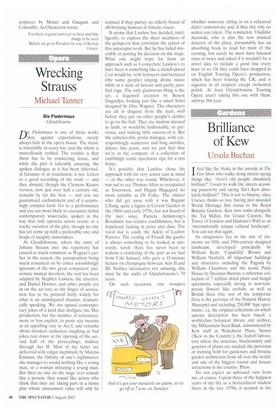Wrecking Strauss
Michael Tanner
Die Fiedermaus Glyndebourne
_L./ Flederrnaus is one of those works that, against expectations, nearly always fails in the opera house. The music is irresistible in every bar, and the whole is marvellously crafted. The trouble is that there has to be connecting tissue, and while the plot is tolerably amusing, the spoken dialogue as it has been inherited, in German or in translation, is not. Listen to a good recording of the work — and they abound, though the Clemens Krauss version, now just over half a century old, remains by far the best — and you are guaranteed enchantment and of a surprisingly complex kind. Go to a performance and you are most likely to encounter lethal contemporary wisecracks, spoken in the way that only operetta actors retain; or a wacky variation of the plot, though no one has yet come up with a preferable one; and heaps of naughty innuendoes.
At Glyndebourne, where the entry of Johann Strauss into the repertoire has caused as much comment as Wagner's earlier in the season, the juxtaposition being much remarked on by critics astonishingly ignorant of the two great composers' passionate mutual devotion, the text has been adapted by Stephen Lawless, the director, and Daniel Dooner, and other people are in on the act too; so the finger of accusation has to be pointed fairly widely for what is an unmitigated disaster, dramatically speaking. We are spared contemporary jokes of a kind that disfigure the Met production, but the number of references, more or less explicit, to penis size mounts at an appalling rate in Act I. and remarks about drunken audiences laughing at bad jokes rain down at the opening of the second half of the proceedings, midway through Act II. Most of the latter are delivered with vulgar ineptitude by Malena Ernman, the Orlofsy of one's nightmares; she manages to sound nothing like a young man, or a woman imitating a young man. But then no one on the stage ever sounds like a person: they sound like actors who think that they are taking part in a funny play whose amusement value will only be realised if they purvey an elderly brand of rib-bruising humour in falsetto voices.
It seems that Lawless has decided, intelligently, to explore the sheer seediness of the goings-on that constitute the action of this unescapist work. But he has failed miserably in putting his decision on the stage. What one might hope for from an approach such as I conjecture Lawless's to have been is something like a clench-jawed Cosi would be, with betrayers and betrayed (the same people) singing divine music while in a state of furious and partly justified rage. The only glamorous thing is the set, a Jugenstil creation by Benoit Dugardyn, looking just like a smart hotel designed by Otto Wagner. The characters are all in disguise from the start, well before they put on other people's clothes to go to the ball. They are mutton dressed as lamb, or would-be fashionable, or parvenus, and making little success of it. But the unbelievably prolix dialogue, with correspondingly numerous and long surtitles. dilutes this point, and we just feel that we're in the company of a collection of ramblingly senile specimens ripe for a rest home.
It's possible that Lawless chose his approach with his very senior cast in mind — or the other way round. Whichever, it was sad to see Thomas Allen so overparted as Eisenstein, and Hagan Hagegard no more suitable as Dr Falke. The oldster who did get away with it was Ragnar Ulfung, quite a figure at Covent Garden in the 1960s and early 1970s, but not heard of (by me) since. Pamela Armstrong's Rosalinde has relative youthfulness, but is hopelessly lacking in poise and class. The vocal star is easily the Adele of Lyubov Petrova. The casting of Frosch the gaoler is always something to be looked at anxiously; surely there has never been so tedious a rendering of the part as we had from Udo Samuel, who gave a 15-minute lecture on champagne between Acts II and III. Neither informative nor amusing, this must be the nadir of Glyndebourne's 70 years.
On such occasions, one wonders whether someone sitting in on a rehearsal didn't remonstrate and, if they did, why no notice was taken. The conductor, Vladimir Jurowski, who is also the new musical director of the place, presumably has an absorbing book to read for most of the evening, but surely he must have listened once or twice and asked if it wouldn't be a novel idea to include a good line every hour or so. Or they could have dropped in on English Touring Opera's production, which has been touring the UK, and is superior in all respects except orchestral polish. At least Glyndebourne Touring Opera aren't taking this one with them, anyway this year.


































































 Previous page
Previous page